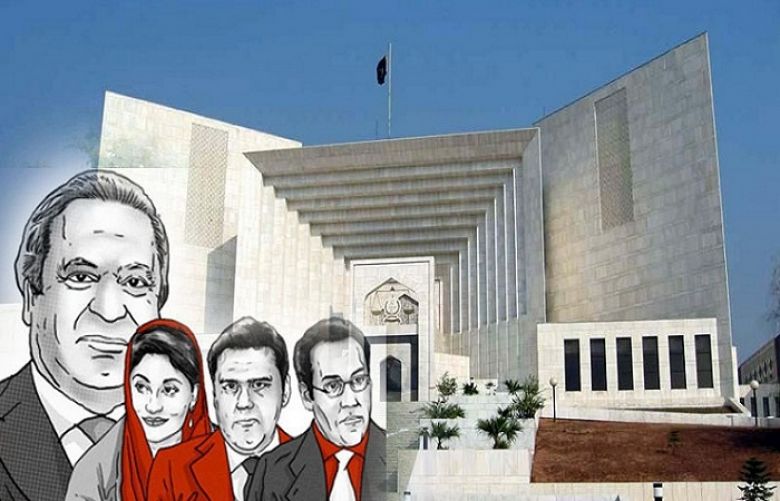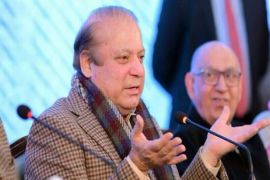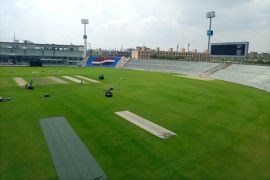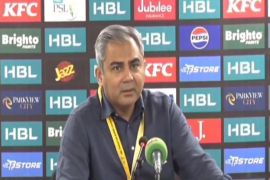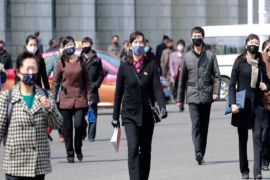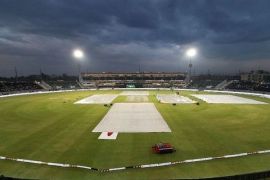The three-member special Supreme Court bench hearing the Panama Papers case observed on Tuesday that it would examine all the material and then decide on disqualifying the premier or sending the matter to an accountability court.
The bench resumed hearing the case on Tuesday after the petitioners presented their arguments in favour of the Joint Investigation Team’s (JIT) final report a day earlier.
Addressing the special implementation bench, headed by Justice Ejaz Afzal Khan, Khawaja Harris, the Sharif family's lawyer, read out the original 13 questions posed by the Supreme Court to the JIT.
He said the court, in its April 20 judgment, had not ordered for reopening of any case against Nawaz Sharif.
Harris claimed the JIT also included probe of 'assets beyond means' in its investigation and went on to answer 15 questions instead of the original 13.
Justice Ijazul Ahsan observed that a number of issues are related to the court's 13 questions. The justice remarked that the money trail of the London properties is a complicated saga.
The main issue is to probe the London money trail, he observed further.
The court will decide if the JIT’s recommendations have to be implemented, he remarked.
In similar comments, Justice Ejaz said the JIT just gave its recommendations whereas any order on the issue will be passed by the court.
“Don’t want to comment on any aspect of the JIT report at this time,” he remarked further.
He said the trial court will decide if including the Hudaibiya Papers Mills case in the JIT report was right or wrong.
Addressing the respondent, Justice Ijaz observed that you could have said anything in your defence but you did not. “Facts were hidden and answers not provided to the JIT,” he remarked. Someone would say they do not remember while others said their accountant may know, he added.
Justice Ijaz also observed that the premier and his sons’ approach was to not say anything to the JIT.
The prime minister and everyone else was given a chance to defend themselves, it is wrong to say otherwise, he remarked further.
Justice Azmat said the bench has heard and understood your arguments.
Harris said it was not the JIT’s mandate to give a verdict. Justice Azmat replied that if the JIT made recommendations after its investigation then what is so wrong with it. “The order of the court will be more important than the JIT’s recommendations,” he observed further.
Addressing Harris, Justice Azmat observed that the respondent has not disputed any document presented in the JIT report.
The premier’s counsel stated in court that the prime minister does not own any offshore company nor received a salary from any such company.
Are you saying this charge is false, asked Justice Azmat. Harris responded in the affirmative. “FZE Capital is owned by Hasan Nawaz,” claimed Harris.
The bench asked Harris if the prime minister is Hasan’s father and chairman of FZE Capital.
Did he not get an aqama? Justice Ijaz asked further.
Harris didn’t clarify if Nawaz is associated in any other way with the company or received a aqama (work permit) from the UAE government.
Harris claimed the JIT probe is not transparent. The prime minister was not asked to verify the documents and thus the court cannot issue an order based on the JIT report, he argued.
Justice Ijaz observed that on one hand it is said they [Sharif family] talk about everything at home yet no one knew who owns the London properties. “The premier kept visiting the flats but doesn’t know who owns them,” he remarked further.
Harris claimed several questions not posed to the prime minister were included in JIT report. “It should be probed why I wasn’t given chance to confront documents against the prime minister,” he said.
Justice Azmat replied that he may submit a separate application to the Supreme Court in this regard.
With regards to volume 10 of the JIT report, which was kept confidential at the request of the JIT, Justice Azmat remarked that the court can make the volume public if the counsel requests it.
Justice Ejaz observed that the JIT inquiry is not ongoing anymore while Justice Ijaz remarked that volume 10 does not contain evidence.
Before the start of the hearing, lawyer Salman Akram Raja, representing Nawaz Sharif's children, said he will present his arguments in court tomorrow.
The court then went into a short recess.
Returning after the break, the prime minister's counsel resumed his arguments.
Justice Ejaz observed that documents were provided to the JIT through Mutual Legal Assistance (MLA). Should we disregard them just on the basis that the government did not provide them the relevant record, he asked.
Harris informed the court that documents not verified by the relevant Pakistani embassy cannot be considered authentic. He reiterated that the foreign government has to be involved in any MLA request.
Justice Ijaz remarked that it was said [from the respondent] that a money trail is available but one was not made available.
“The JIT was formed so the prime minister and others could independently provide evidence and their points of view,” he observed further.
Justice Ejaz remarked that there are only two ways to proceed now: either the bench or an accountability court takes matters further.
Justice Ijaz responded that if the documents being provided are original they do not require verification by the embassy.
Justice Ijaz remarked that the prime minister, Maryam and Hasan said they would present evidence in their defence but failed to do so. “The JIT was formed to give the Sharif family a chance. It was not formed to bring additional matters to the fore but now that that has happened is a different thing,” he observed.
The ownership if the London properties will have to be proved with records, observed Justice Ejaz. He remarked that it was the premier’s job to provide record of how funds were generated to purchase the London flats. “We will peruse the complete material and then decide if a disqualification is warranted or not,” he remarked further.
Justice Azmat observed that the Sharif family was given a chance in court to give records before the formation of the JIT. “Not a single document was brought forward showing that Hussain Nawaz owns the London flats,” he observed, adding that there are cases available where owner of assets has to provide the money trail.
The bench also observed that the April 20 order of the five-judge bench was interim.
The hearing was later adjourned till tomorrow.
As was the case on Monday, Awami Muslim League (AML) chief Sheikh Rashid informally began the day's events by addressing the media. He said they [Sharifs] have no case.
The AML chief also criticised the Sharif family's claims against ISI's Brig (retd) Nauman Saeed — one of two JIT members from military intelligence agencies.
"Don’t mess with the judges and the generals. There were 19 cases against Nawaz Sharif and he was only tried in two," said Rashid.
State minister Abid Sher Ali addressed the media afterwards and came down hard on Sheikh Rashid. He also crticised Pakistan Muslim League-Q leader Chaudhry Shujaat Hussain for being an uninvited guest at yesterday's hearing.
The state water and power minister said the courts will decide the matter according to facts not people's wishes.
Opposition Leader Khursheed Shah said the Supreme Court is the country’s biggest court where justice is dispensed. Speaking to the media outside the apex court, the senior Pakistan Peoples Party leader said they have faith in the Supreme Court.
Shah also reiterated the opposition's demand for the prime minister's resignation, saying the preservation of democracy is supreme.
Last hearing
On Monday, the petitioners delivered their arguments in favour of the Panama case JIT report and against the Sharif family.
The counsels for the Pakistan Tehreek-e-Insaf (PTI), Jamaat-e-Islami (JI) and Sheikh Rashid presented their arguments during Monday’s proceedings.
PTI counsel Naeem Bukhari pleaded with the apex court to summon Prime Minister Nawaz Sharif for cross examination, disqualify him from Parliament and send cases against him and his family to an accountability court.
The counsel for JI argued that the premier did not speak the truth during his speech in Parliament.
Sheikh Rashid, presenting his arguments, said the nation was embarrassed to find out its prime minister is a paid employer of another company.
In his brief remarks to the bench on Monday, the Sharif family's lawyer said a case against the Sharif family cannot be undertaken on the basis of the JIT report.
The bench observed that an investigation was required based on the nature of the allegations and was thus directed. "The JIT was not conducting a trial...choose you words carefully," observed Justice Sheikh Azmat Saeed.
Later, the bench adjourned the hearing, with Justice Ejaz observing that they do not wish to waste the court and the nation's time.
During proceedings, Justice Ejaz wondered if the JIT can trust the veracity of the documents while Justice Ijazul Ahsan asked the JI counsel to inform the bench to what extent could it implement the JIT’s findings and use its authority.
The JIT, formed in light of the apex court’s April 20 judgment to probe the Sharif family’s money trail, submitted its 60-day investigation report to the court on July 10.
The report highlighted the failure of the Sharif family to provide a money trail for its London apartments and claimed the prime minister and his children own assets beyond their known sources of income.
Following the report's submission, the special bench issued notices to all parties to submit their responses.

